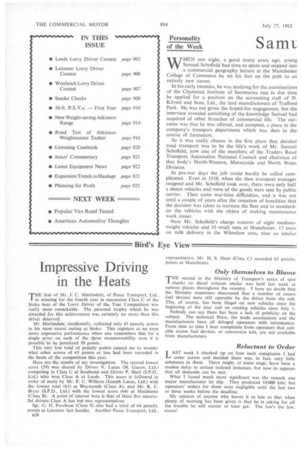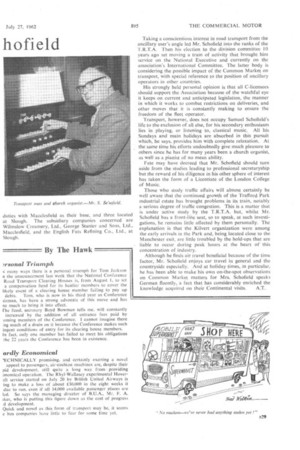Impressive Driving in the Heats
Page 36

Page 37

If you've noticed an error in this article please click here to report it so we can fix it.
THE feat of Mr. J, C. Martindale, of Pease Transport, Ltd., in winning for the fourth year in succession Class C of the Stoke heat of the Lorry Driver of the Year Competition was really most remarkable. The personal trophy which he was awarded for this achievement was certainly no more than this driver deserved.
Mr. Martindale, incidentally, collected only 43 penalty points in his most recent outing at Stoke. This registers as an even more impressive performance when one remembers that for a single error on each of the three manceuvrability tests it is possible to be penalized 50 points.
This very low total of penalty points caused me to wonder what other scores of 65 points or less had been recorded in the heats of the competition this year.
Here are the results of my investigation. The second lowest score (59) was shared by Driver V. Lucas (H. Garon, Ltd.) competing in Class C at Southend and Driver P. Steel (S.P.D., Ltd.) who won Class A at Leeds. This score is followed in order of merit by Mr. P. C. Willcox (Joseph Lucas, Ltd.) with the lowest total (61) at Weymouth (Class A), and Mr. R. C. Bryer (S.P.D., Ltd.) with the lowest score (64) at Maidstone (Class B). A point of interest here is that of these. five successful drivers Class A has but two representatives.
Sgt. G. H. Purchase (Class S) also had a total of 64 penalty points at Leicester last Sunday. Another Pease Transport, Ltd., 1328
representative, Mr. H. S. Hunt (Class C) recorded 65 penalty points at Manchester.
Only themselves to Blame
THE second in the Ministry of Transport's series of spot checks on diesel exhaust smoke was held last week at various places throughout the country. I have no doubt that the Ministry examiners discovered that a number of excess fuel devices were still operable by the driver from the cab. This, of course, has been illegal on new vehicles since the beginning of the year and on existing vehicles since July 1.
Nobody can say there has been a lack of publicity on the subject. The technical Press, the trade associations and the manufacturers have all deluged operators with information. From time to time I hear complaints from operators that suitable excess fuel devices, or conversion kits, are not available frOm manufacturers.
Reluctant to Order
LAST week I checked up on four such complaints had come across and decided there was, in fact, very little substance in them. There might, at some stage, have been a modest delay in certain isolated instances, but now its appears that all demands can be met.
What I found much more significant was the remark one major manufacturer let slip. They produced 10,000 kits; but operators' orders for them were negligible until the last two or three weeks before the deadline.
My opinion of anyone who leaves it as late as that when plenty of warning has been given is that he is asking for all the trouble he will sooner or later get. The law's the law, mates!
?rsonal Triumph
%I many ways there is a personal triumph for Tom Jackson n the announcement last week that the National Conference Road Transport Clearing Houses is, from August 1, to set a compensation fund for its haulier members to cover the likely event of a clearing house member failing to pay up debts. Tom, who is now in his third year as Conference lirman, has been a strong advocate of this move and has ne much to bring it into effect.
ihe fund, secretary Boyd Bowman tells me, will constantly increased by the addition of all entrance fees paid by orning members of the Conference. I cannot imagine there flg much of a drain on it because the Conference makes such ingent conditions of entry for its clearing house members. In fact, only one member has failed to meet his obligations the 22 years the Conference has been in existence.
.ardly Economical
,ECHNICALLY promising, and certainly exerting a novel appeal to passengers, air-cushion machines are, despite their pid development, still quite a long way from providing onomical operation. The Rhyl-Wallasey experimental Hoverift service started on July 20 by British United Airways is jog to make a loss of about £30,000 in the eight weeks it due to run, even if all 14,000 available passenger places are led. So says the managing director of B.U.A., Mr. F. A. iker, who is putting this figure down as the cost of progress
d development.
Quick and novel as this form of transport may be, it seems
e bus companies have little to fear for some time yet.
































































































































